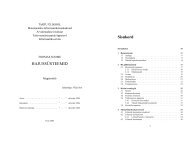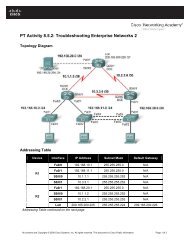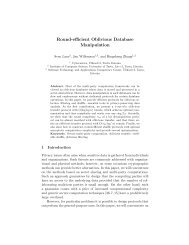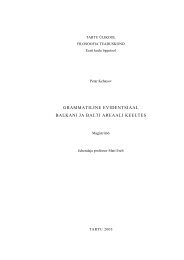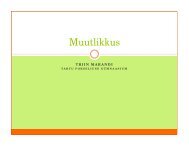APPENDIX 1
APPENDIX 1
APPENDIX 1
You also want an ePaper? Increase the reach of your titles
YUMPU automatically turns print PDFs into web optimized ePapers that Google loves.
Disclaimer:<br />
These appendices are the integral part of the following publication:<br />
Ehala, Martin and Zabrodskaja, Anastassia. 2014. “Hot and cold ethnicities in the Baltic<br />
states.” Journal of Multilingual and Multicultural Development 35(x), xxx-xxx.<br />
These appendices are licensed under a Creative Commons Attribution-NonCommercial-<br />
ShareAlike 3.0 Unported License.<br />
See http://creativecommons.org/licenses/by-nc-sa/3.0/<br />
<strong>APPENDIX</strong> 1<br />
Abbreviations:<br />
X – Minority language (territory, culture, etc)<br />
Y – Majority language (territory, culture etc)<br />
NB! This version of the questionnaire is for those that self-identify as X.<br />
General background questions<br />
1) Gender: male, female<br />
2) Age:<br />
3) What ethnic group do you consider you belong to? (You can choose many options)<br />
X, Y, other (which? specify)<br />
4) What is your mother tongue? (You can choose many options): X, Y, other (what?<br />
specify)<br />
5) Where have you born? In X, Y, in other country (specify, where)<br />
6) Where was your father born? In X, Y, in other country (specify, where)<br />
7) Where was your mother born? In X, Y, in other country (specify, where)<br />
8) Your marital status: not married, in non-official marriage, divorced,<br />
widow/widower<br />
9) How many people share the same household with you?<br />
10) Your education:<br />
- unfinished basic<br />
- basic or unfinished secondary education<br />
- secondary education<br />
- specialized secondary education or vocational training<br />
- higher education or scientific degree<br />
11) Your employment status:<br />
- businessman or self-employed entrepreneur<br />
- employee in public sector<br />
- employee in private sector<br />
- employee in NGO<br />
- pensioner<br />
- workless<br />
- pupil or student<br />
- housewife<br />
- on maternity/paternity leave<br />
- other (specify please)<br />
1
12) How would you characterize economic situation in your family?<br />
- Considerably below average<br />
- Slightly below average<br />
- Average<br />
- Slightly above average<br />
- Considerably above average<br />
14) Where do you live now? (If you have many options, then choose please the main<br />
one)<br />
- Town<br />
- Town<br />
- Parish<br />
- Parish<br />
Section R<br />
How do you use languages in everyday life?<br />
Please answer to the following questions using the scale below (you can choose<br />
two options if necessary).<br />
Only<br />
in X<br />
Mainly<br />
in X<br />
More in<br />
X than in<br />
Y<br />
Equally in<br />
X and Y<br />
More in<br />
Y than in<br />
X<br />
Mainly<br />
in Y<br />
Only<br />
in Y<br />
In other<br />
language<br />
1 2 3 4 5 6 7 8<br />
R01<br />
R02<br />
R03<br />
R04<br />
R05<br />
R06<br />
R07<br />
R08<br />
R09<br />
R10<br />
In which language are you communicating with your family members?<br />
In which language are you communicating with your friends?<br />
In which language are you communicating with your colleagues (classmates<br />
or co-students)?<br />
In which language are you communicating in your hobby activities (arts<br />
circles, sports, etc)?<br />
In which language are you communicating in shops and services?<br />
In which language are you communicating with strangers in a bus, on a street,<br />
in a shop?<br />
In which language are the TV programs that you watch?<br />
In which language are the radio broadcasts that you listen to?<br />
In which language are the newspapers that you read?<br />
In which language are the cultural events (concerts, theatre, festivals) that you<br />
attend?<br />
How do you assess the cultural differences between X and Y? Please indicate<br />
your opinion on the scale.<br />
1 – very different; 2 – different; 3 – more different than similar; 4 – hard to evaluate; 5 – more<br />
similar than different; 6 – similar; 7 – very similar.<br />
R11 In terms of the visual appearance, how different are the Ys and 1 2 3 4 5 6 7<br />
you?<br />
R12 In terms of the lifestyle, how different are the Ys and you? 1 2 3 4 5 6 7<br />
R13 In terms of the life values, how different are the Ys and you? 1 2 3 4 5 6 7<br />
R14 In terms of religious beliefs, how different are the Ys and you? 1 2 3 4 5 6 7<br />
R15 In terms of dress style, how different are the Ys and you? 1 2 3 4 5 6 7<br />
R16 In terms of daily food preferences, how different are the Ys and 1 2 3 4 5 6 7<br />
you?<br />
R17 In terms of free time activities, how different are the Ys and<br />
you?<br />
1 2 3 4 5 6 7<br />
2
1 – very easy; 2 – easy; 3 – rather easy than difficult; 4 – hard to answer; 5 – rather difficult<br />
than easy; 6 – difficult; 7 – very difficult.<br />
R18 How easy is to become a friend of a Y? 1 2 3 4 5 6 7<br />
R19 How easy is to communicate with a Y in relation to 1 2 3 4 5 6 7<br />
studies/work?<br />
R20 How easy is to have an acquaintance with a Y? 1 2 3 4 5 6 7<br />
Sections G1 and G2<br />
Please assess the strength of X language and culture in relation to Y language<br />
and culture. Indicate your choice on the scale (1…7).<br />
1 (very much) – ... – 7 (very little)<br />
G20 How much are X culture and tradition appreciated in 1 2 3 4 5 6 7<br />
the society?<br />
G10 How much are Y culture and tradition appreciated in 1 2 3 4 5 6 7<br />
the society?<br />
G22 How much is X language appreciated in the Y society? 1 2 3 4 5 6 7<br />
G12 How much is Y language appreciated in the Y society? 1 2 3 4 5 6 7<br />
1 (very many) – ... – 7 (few)<br />
G21 How many eminent talents (writers, actors, artists, 1 2 3 4 5 6 7<br />
singers, scientists, journalists) are there among the X?<br />
G11 How many eminent talents (writers, actors, artists, 1 2 3 4 5 6 7<br />
singers, scientists, journalists) are there among the Y?<br />
G23 How many wealthy employers and businessmen are 1 2 3 4 5 6 7<br />
there among the X?<br />
G13 How many wealthy employers and businessmen are 1 2 3 4 5 6 7<br />
there among the Y?<br />
G24 How much is X language used in media (newspapers, 1 2 3 4 5 6 7<br />
radio, TV and internet) in Y country?<br />
G14 How much is Y language used in media (newspapers, 1 2 3 4 5 6 7<br />
radio, TV and internet) in Y country?<br />
G25 How much is X language used in education (nurseries, 1 2 3 4 5 6 7<br />
schools, universities) in Y country?<br />
G15 How much is Y language used in education (nurseries, 1 2 3 4 5 6 7<br />
schools, universities) in Y country?<br />
G2<br />
6<br />
G1<br />
6<br />
1 (quickly increases) – ... – 7 (quickly decreases)<br />
How would you estimate the population of X (in Y 1 2 3 4 5 6 7<br />
country)?<br />
How would you estimate the population of Y (in Y 1 2 3 4 5 6 7<br />
country)?<br />
1 (very active) – ... – 7 (inactive at all)<br />
G27 How active and powerful are Xs in the Y society? 1 2 3 4 5 6 7<br />
G17 How active and powerful are Ys in the Y society? 1 2 3 4 5 6 7<br />
1 (very wealthy) – ... – 7 (not wealthy at all)<br />
G28 How wealthy are Xs in Y society? 1 2 3 4 5 6 7<br />
G18 How wealthy are Ys? 1 2 3 4 5 6 7<br />
3
1 (very strong) – ... – 7 (not strong at all)<br />
G29 How strong will the X language and culture be in Y 1 2 3 4 5 6 7<br />
country in 20 to 30 years in comparison with the<br />
present?<br />
G19 How strong will the Y language and culture be in Y<br />
country in 20 to 30 years in comparison with the<br />
present?<br />
1 2 3 4 5 6 7<br />
Section U<br />
Below a number of persons are characterized. Please indicate how similar the<br />
person portrayed by the statement is to you.<br />
1 – very similar to me; 2 – similar to me; 3 – somewhat similar to me; 4 – somewhat<br />
different from me; 5 –different from me; 6 – very different from me.<br />
U01 It is important for him to make things on his own. He likes<br />
to be free and not to depend on others. 1 2 3 4 5 6<br />
U02 He does not want to waste time for unimportant people<br />
and things that do not take him forward in life. It is 1 2 3 4 5 6<br />
important for him to concentrate on achieving his goals.<br />
U03 Self-realization is more important for him than relations to<br />
his close ones. He is not afraid of ruining relations if these 1 2 3 4 5 6<br />
start to disrupt the fulfilment of his goals.<br />
U04 Success in career is more important to him as friends and<br />
acquaintances. He would be ready to move his home when 1 2 3 4 5 6<br />
he got a lucrative job offer, even if it would mean to lose<br />
his existing social network.<br />
U05 He is open to all new. He finds that traditional way of<br />
living and old fashioned values have become hindrance to 1 2 3 4 5 6<br />
progress.<br />
U06 He does not feel loyalty to his locale. He is ready to live<br />
and work everywhere if the conditions satisfy him. 1 2 3 4 5 6<br />
U07 Following traditions is important to him. He considers<br />
abandoning family, religious or cultural customs<br />
inappropriate.<br />
4<br />
1 2 3 4 5 6<br />
U08 He values his roots. He values his heritage culture and his<br />
birth community highly. 1 2 3 4 5 6<br />
U09 He considers important to follow the practices of his<br />
culture. It is important to him that his children would<br />
value these customs and traditions, too.<br />
1 2 3 4 5 6<br />
U10 Linguistic and cultural purity is important to him. He tries<br />
to avoid foreign influences in his language and behavior. 1 2 3 4 5 6<br />
Section D<br />
How much do you agree with the following statements?<br />
1 (totally agree); 2 (agree); 3 (rather agree); 4 (rather disagree); 5 (disagree); 6 (totally<br />
disagree).<br />
D01 X should be one of official/regional languages in Y 1 2 3 4 5 6<br />
country.<br />
D02 The duty of Y country is to support the maintenance of X 1 2 3 4 5 6<br />
language and culture.
D03 The situation of the X community in Y society 1 2 3 4 5 6<br />
corresponds to international norms.<br />
D04 Concerning the X community, the Y country follows 1 2 3 4 5 6<br />
European democratic principles.<br />
D05 Ys are helpful as cultural go-betweens. 1 2 3 4 5 6<br />
D06 Ys are reliable. 1 2 3 4 5 6<br />
D07 Xs are regarded well by Ys. 1 2 3 4 5 6<br />
D08 Ys wish to cooperate with Xs. 1 2 3 4 5 6<br />
D09 Ys behave under the influence of their lowest instincts. 1 2 3 4 5 6<br />
D10 Ys are aggressive. 1 2 3 4 5 6<br />
<strong>APPENDIX</strong> 2<br />
The focus group interview protocol. In [cursive] some guidelines for an interviewer<br />
are given. Still, these are general questions which should be accommodated depending<br />
on the nuances of an interethnic situation studied.<br />
0) Biographical background<br />
Please introduce yourself: where were you born, your age, native language(s),<br />
knowledge of other languages, where your family lives, citizenship etc.<br />
1) Questions about self-identification (categorization), i.e. national and ethnical<br />
identity<br />
These questions should give an overview about notable identities for interviewees and<br />
possible identity trajectories. This should give an idea, what external groups are<br />
important for a person, a member of what group he or she would like to become or<br />
membership in what group he or she would like to strengthen.<br />
If to ask you who do you feel yourself, then what would you answer? “Who am I? I<br />
am…”<br />
With who are you identify yourself with? In addition to the above mentioned who are<br />
you? [If the match causes a psychological confrontation, then ask in a different way.]<br />
And if you start now imagine yourself in 10 years, then who you would like to feel<br />
when / who you want to be?<br />
And who you would like to be considered by people? [Converse to categories.]<br />
[Named (were not named) several categories.] Now I would like to talk about the<br />
emerging associations with them. What associations (positive, negative, the<br />
connection with opportunities etc.) / feelings do you have with the word “...” (here<br />
name a category depending on what was named in a group)? Can you say about<br />
yourself that you are (here name a category depending on what was named in a<br />
group)?<br />
What do you think is the role of a language in self-identification (to which group I<br />
belong)? Whether the language determines that who are you comparing with / whom<br />
do you feel yourself?<br />
5
Could you please repeat what citizenship you have? Are you ready to change it?<br />
Why? What feelings does it cause in you?<br />
Imagine that you are visiting a friend in London. His friends came to him. How will<br />
you introduce yourself? Tell that you are ... [who]. Why? What do you think how you<br />
will be understood?<br />
You home is [name a country where your respondent lives]. With what your country<br />
is primarily associated?<br />
And for your mother/father/grandmother/grandfather your country is ... ? (Think, try<br />
to guess...)<br />
You are ready to move from your country? Why? Where to? If you move somewhere,<br />
then what do you think you would you miss most (in relation to your today’s<br />
country)?<br />
2) Questions about perceived cultural distance between groups (factor R)<br />
You named who you would most like to feel in the future / where (which group) you<br />
would very much like to belong to. [Here it is necessary to take into account the fact<br />
that in a focus group several categories were named... Therefore it would be difficult<br />
to develop a joint conversation because everyone can speak here about the different<br />
groups! There could be two solutions: (1) start with the category which was named<br />
the most frequently and turn to the person who named it first. He speaks and other<br />
can supplement. Then take the next category. And those who did not name this<br />
category can express their opinion on the matter hypothetically that if they wanted too<br />
and if it would be hard. (2) Allow to each interviewee to finish his story to the end,<br />
that is to answer the questions of the part, others may choose to supplement but their<br />
own stories are told separately. – The decision depends on the dynamics of the<br />
group!]<br />
What do you need to do in order to become a member of the named group (groups)?<br />
Do you need any transformations? What kind of? Who needs to be changed? In what<br />
direction? Would it be difficult?<br />
What do you think of people of this group? Do you now feel yourself similar to them<br />
or different from them? What are the main similarities / differences you might name?<br />
Do others see these similarities/differences, that is members of this out-group feel that<br />
you are one of them, similar to / different from them? What about attitudes of thirdparty?<br />
What kind of attitude do you feel from the people who are already members of this<br />
group? [If someone answers that a sense of alienation, an interviewer can ask: what<br />
feelings does such attitude cause?]<br />
If informants want to become members of the out-group: Why? What is to be done for<br />
that? Who needs to do what? Do you believe that? What do you think how much time<br />
it might take?<br />
If informants do not want to become members of the out-group: Why?<br />
6
Before that we were talking about the role of language. You said that… [In the case if<br />
the interviewees said that the language defines their belonging to the group]. In order<br />
to become a member of the group that you named do you need to change the everyday<br />
language of communication? Are you ready / Do you agree to change your language<br />
behavior? Why? For you it will be hard or easy?<br />
How do you see the language situation in your country in the near future?<br />
3) Questions about appreciation of traditions vs. utilitarianism (factor U)<br />
Earlier we were talking about the differences [if were] – changes –<br />
Do you agree to act in the name of the decreasing of differences – are you ready to<br />
change yourself?<br />
If ready to change: How would react those to whom you now belong to (your<br />
community members)? Other important groups? For example, what your mother<br />
would say? Father? Grandmother? Grandfather? Children? [Only then if informants<br />
say that something negative, you start talking about the origin, the rejection of<br />
traditions.]<br />
How would react the group a member of which you would like to become? Would<br />
they accept you as one of them? Why? (If yes, what should you do in order to get<br />
accepted? And what should they do? [In the case if the interviewees said that they<br />
would like to be accepted by the out-group] And if an out-group does not accept you,<br />
what should you do in this case?)<br />
This has already been discussed but still the same again: should they also do<br />
anything?<br />
How much do you think it is possible that it all works out?<br />
If not ready to change: and what are the reasons that you, on the one hand, want to<br />
become a member of this group, but, on the other hand, do not want to do anything in<br />
the name of this?<br />
In one word, are the barriers more internal (identity and/or in-group, cannot get over<br />
yourself) [do not give any examples but explain in your own words if an interviewee<br />
does not understand the question] or external (procedure for obtaining citizenship) [do<br />
not give any examples but explain in your own words if an interviewee does not<br />
understand the question]?<br />
Do you have any contacts with out-group member? What kind of?<br />
- Colleagues? If yes, what are the relations with them? How do you communicate<br />
[languages]? Do you talk about history? Are your understandings (interpretation) of<br />
history the same or different? Are there topics which you interpret similarly? If no,<br />
can such situation change? Why? How? What it would mean for you?<br />
- What if your brother / sister / best friend would find a partner among out-group<br />
members? What it would mean for you?<br />
7
- Would it be realistic for you to fall in love with an out-group member? Marry<br />
him/her? What it would mean for your family? Would your beloved / husband / fiancé<br />
be accepted? Under what conditions? Would his / her family accept you? Why do you<br />
think so?<br />
We talked about the friends of your friend who lives in London and the fact what you<br />
would tell them about your national / ethnic [if national / ethnic membership was<br />
named] membership. What your family would think about your responses? What outgroup<br />
members would think about your responses?<br />
4) Questions about perception of ethnocultural symbolic capital (factor PSD)<br />
A man needs a positive self-esteem and tries to achieve it through group membership.<br />
Different groups have different power, status, achievements that all together can be<br />
named group’s cultural mass [symbolic capital]. A group with bigger cultural mass<br />
[symbolic capital] gives their members the opportunity for positive self-esteem but a<br />
group with small cultural mass [symbolic capital] does not. Though, the perception of<br />
cultural mass [symbolic capital] by in-group member depends on which our-group is<br />
taken for comparison. It is especially important to have at least as large cultural mass<br />
[symbolic capital] as compared out-group has.<br />
What feelings are caused by the recognition that you are... [who]?<br />
If interviewees say “pride” etc.: Why? [In the case of positive as well as negative<br />
response] Is this feeling also usual for other members of your group in relation to the<br />
group itself, to its identity? Why?<br />
If a group was given a low status: What do you think why your group has the low<br />
status? Is it possible to raise it? What could you do personally? What is needed for<br />
that?<br />
You said that in the future you would like to be…. How is it? What does it give?<br />
What feelings does this idea cause? How would your life change?<br />
5) Questions about perception of interethnic discordance (factor D)<br />
Interethnic relations are not created only on the basis of a rational evaluation of the<br />
differences, similarities, cultural and historical achievements of groups “us” and<br />
“they”. Very weighty role play also emotions, especially in situations when in the<br />
groups’ shared history happened oppositions in the protection of own interests.<br />
Emotional evaluation of interethnic relations is based on two components: legitimacy<br />
and ethics. In the case of legitimacy the determining question of whether relationships<br />
between group “we” and group “they” are legitimate is if the status and rights of<br />
both groups are in balance in the society. In the case of ethics the determining<br />
assessment is how ethically and worthily “they” behave. If the total score of<br />
interethnic justice and ethics of an out-group is high, then intergroup discordance is<br />
low because the emotional tone of interethnic relations is friendly or neutral. If intergroup<br />
power relations seem unfair and there is a feeling that the members of the outgroup<br />
behave inhumanely, then intergroup discordance can be assessed as high.<br />
If you compare the different groups in relation to language aspect, then what do you<br />
think about their status? Is there a difference in [here name a country where<br />
8
espondents live] which group to belong to? Who live well in [here name a country<br />
where respondents live]?<br />
And the status of your group in the society (in the world) is fair?<br />
If yes: how did this status appear? Who, what or how has helped?<br />
Do other groups in [here name a country where respondents live] respect your group?<br />
For what reasons? In what ways?<br />
What feelings do you have associated with those groups who respect you in [here<br />
name a country where respondents live]?<br />
If not: why not? How is it expressed? What needs to be differently, what should be<br />
changed? What should have been a fair assessment of your group, fair status, just<br />
position in society?<br />
Can you say that someone so to say “helped” or “helps” the emergence of this unfair<br />
situation, in your opinion? Who? How? Why? (Through ignorance? Intentionally?<br />
What do you think with what purpose?)<br />
What do you feel about those groups who you think about that they are unfair to your<br />
group?<br />
9



